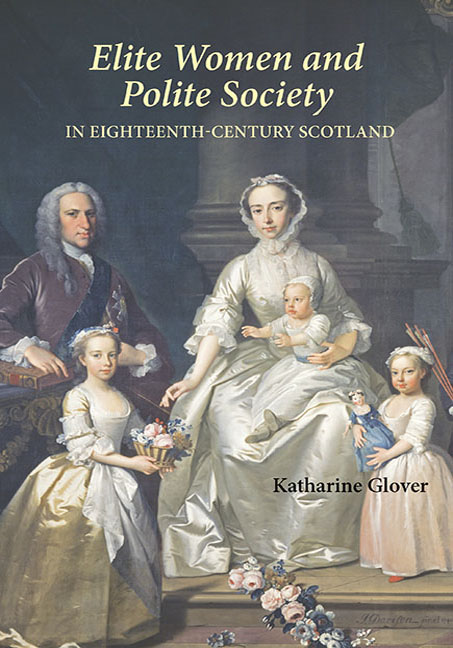Book contents
- Frontmatter
- Contenst
- Dedication
- Acknowledgements
- List of Abbreviations
- Preface
- 1 Elite Women and Eighteenth-Century Scottish Society
- 2 Education and Upbringing
- 3 Reading and Print Culture
- 4 Polite Sociability: Space and Social Practices
- 5 Politics and Influence
- 6 Travel, Tourism and Place
- Conclusion
- Appendix Biographical Backgrounds
- Bibliography
- Index
1 - Elite Women and Eighteenth-Century Scottish Society
Published online by Cambridge University Press: 08 April 2017
- Frontmatter
- Contenst
- Dedication
- Acknowledgements
- List of Abbreviations
- Preface
- 1 Elite Women and Eighteenth-Century Scottish Society
- 2 Education and Upbringing
- 3 Reading and Print Culture
- 4 Polite Sociability: Space and Social Practices
- 5 Politics and Influence
- 6 Travel, Tourism and Place
- Conclusion
- Appendix Biographical Backgrounds
- Bibliography
- Index
Summary
‘Growing polit with the rest of the World’
When a weekly dancing assembly was set up in Edinburgh in the winter of 1723, it prompted Margaret, Countess of Panmure to comment in a letter to her husband that ‘att last … Old Reeky [i.e., Edinburgh] will grow polit with the rest of the World’. Dancing assembly rooms had begun to develop in English resort towns from the late seventeenth century, and their popularity quickly spread, so that by the time the Countess was writing, assemblies were one of the defining social spaces of what had become known as polite society. The concept of politeness lay at the heart of eighteenth-century elite society, particularly during the period to about 1770 with which this book is concerned. In this period to be polite meant far more than just the ability to demonstrate good etiquette or considerate behaviour; indeed, for Paul Langford, ‘politeness’ can be seen as a ‘key-word’ which opens up the mentality of the period. Politeness was in its broadest sense an all-embracing concept: the social elite were known as ‘the polite’; the society in which they moved was ‘polite society’. But as the Countess of Panmure's comment suggests, it retained a strong aspirational quality, and the simple fact of aristocratic or genteel birth was not necessarily to be regarded by one's peers as genuinely polite. An amorphous concept, open to multiple interpretations by contemporaries as well as historians, eighteenth-century politeness is probably best understood as an ideal to which those of genteel and aristocratic birth were raised to conform, and as a continuous programme of social improvement to which it was generally expected that they would aspire throughout their lives.
Polite behaviour emphasised, in the words of Peter Borsay, ‘triple constituents of civility, sociability and improvement’, or, in those of Philip Carter, ‘propriety or decorum’, good manners, and ‘the display of generosity and accommodation to one's companions’. Polite society emphasised ‘ease and informality’ as opposed to ‘constraint and ceremony’. The polite made fashionable the pursuit of not just good manners, but of reason, tolerance and improvement of the mind gained and spread through social interaction, particularly conversation.
- Type
- Chapter
- Information
- Publisher: Boydell & BrewerPrint publication year: 2011



